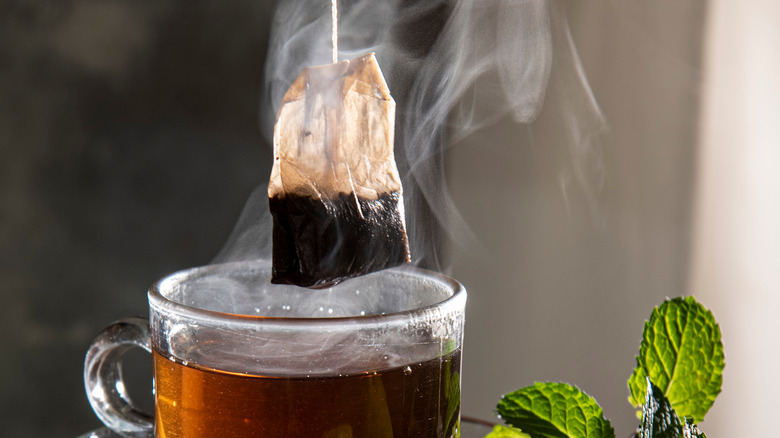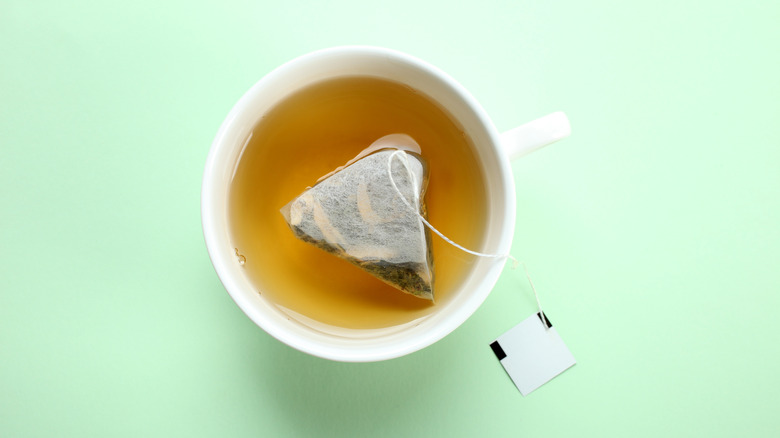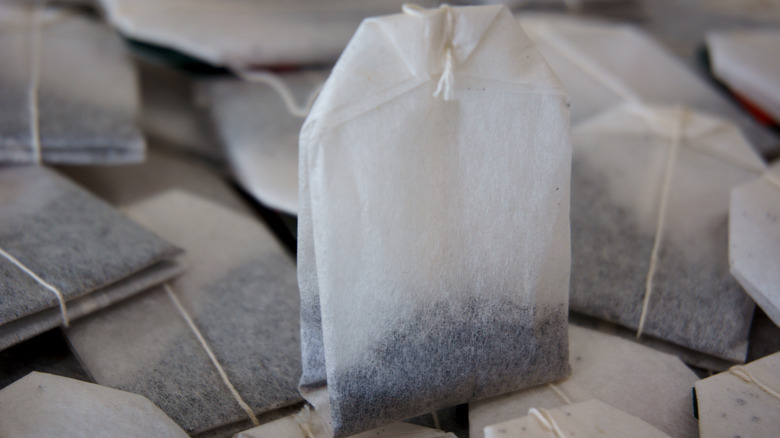The Invention Of Tea Bags Was A Total Accident
Tea is the most popular drink in the world (excluding water), but you probably wouldn't guess that living in the United States. Sure, we've got our sweet tea and Arnold Palmers, but most Americans vastly prefer coffee, while tea is more closely associated with Asia (particularly its native home of China) and the United Kingdom. Considering this, it comes as a bit of a shock to learn that one of the most important inventions in the history of tea drinking came from the U.S.A. We're talking about the tea bag, which was invented by a New York tea merchant named Thomas Sullivan. At least, that's what a lot of sources say, but the truth is a bit more complex.
The origins of the tea bag are cloudier than a cup of matcha, which is surprising considering it was only introduced in the early 1900s. That's awfully recent, given that people have been drinking tea for multiple millennia, but we can chalk that up to the fact that much of the tea historically grown in China had such large leaves that you didn't need to strain them. It was only when the British established tea plantations in India that grew much smaller leaves that the concept of a tea strainer really gained appeal. Straining baskets and tea infusers came first, but Thomas Sullivan's tea bags have become far more common. The only thing is, he didn't invent them on purpose. In fact, he didn't really invent them at all.
The tale of Thomas Sullivan
Many sources trace the tea bag's origin to 1908, and the aforementioned Thomas Sullivan, a tea importer in New York City. As the popular story goes, Sullivan hoped to attract customers by sending out samples of his product. It was customary to ship tea in small tins, but the thrifty Sullivan was looking for a way to save money, so he instead packaged his tea leaves in silk bags. He intended the customers to pour the contents of each bag into one of the tea strainers popular in that era, but that's not what they did. Recognizing that the mesh weave of the silk would allow water to permeate it, customers simply dunked the whole bags in hot water.
Eventually, Sullivan heard that his clientele was doing this and recognized they were onto something. He ultimately switched from silk bags to ones made of gauze, which had a looser weave, allowing the water to circulate through the leaves better. However, can we really say that Thomas Sullivan "invented" the tea bag when it was the result of his customers' confusion? Perhaps, except for the fact that someone else had already invented the tea bag seven years earlier, and they definitely did not do it by accident.
Who really invented the tea bag?
On August 26, 1901, a pair of women in Milwaukee, Wisconsin named Roberta C. Lawson and Mary McLaren (the latter's name has been erroneously recorded as 'Molaren' by multiple sources) jointly filed a patent for a "Tea Leaf Holder" that closely resembles the modern tea bag. Their application was granted in 1903 as U.S. Patent No. 723,287, giving us concrete evidence that Thomas Sullivan's tea bags were not a new concept. What's more, there was nothing accidental about Lawson and McLaren's creation. They had identified a key problem with tea strainers of their day, which was the fact that they only worked for brewing whole pots of tea. Lawson and McLaren wanted to create a device that would allow people to brew a single cup of tea at a time without wasting any of the drink.
Accidental inventions make for entertaining stories, but this is one case where the legend seems blatantly false. That being said, it's possible that the legend of Thomas Sullivan has some truth behind it, despite the fact that Lawson and McLaren had a clear head start. Although they secured a patent in 1903, it appears that the women were never able to successfully market their tea bags on a large scale. Sullivan and his customers were likely unaware that they had stumbled upon something that already existed. On the other hand, the customers who dunked their bags of tea in water may have been inspired to do so by the preexisting invention.


